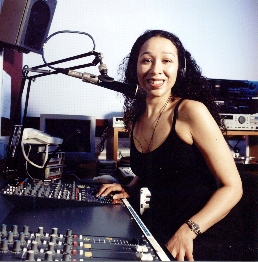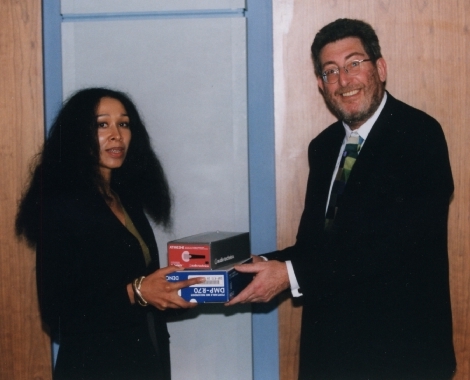

1998 winner Carol de Smith
Carol de Smith accepting
her award from Larry Grant at the
Radio Festival in Birmingham.
The
Linda Gage Memorial Award
1998
The winner of the 1998 Linda Gage Memorial Award was Carol de Smith, a student from Lambeth College in South West London. In making the award, the judges commented that "she showed excellent qualities of presentation and structure in her examination of the state of marriage and divorce". (Click here for judges comments in full).
The judges this year expressed concern at the quality of presentation of many of the entries. This criticism resulted in some harsh words in the UK Press Gazette particularly following an earlier article about the failure of colleges to give broadcast students proper voice training.
Carol de Smith, in accepting the award at the Radio Festival in Birmingham, said, "I was very lucky to have found the course because it was excellent and the standard of teaching has been brilliant. The tutors have been very generous with their expertise."
|
|
|
|
1998 winner Carol de Smith |
Carol de Smith accepting
her award from Larry Grant at the |
The Linda Gage Memorial Award 1998
Judges Comments
It is always gratifying to find that so many contestants have entered the Linda Gage Memorial Award. Entries have come from all parts of the United Kingdom and the Irish Republic.
The entries, quite rightly, cover a variety of topics. They range from the intriguing and well produced 'Children of Chaos' by Maiko Nishiyama and Kirsten J. Beasty (University of Westminster) which makes good use of sound effects and music, to an investigation into the cause and effect of 'El Nino' by Katie Keward (City University).
There are, however, several important points to be made, which both contestants and lecturers should bear in mind.
Voice Presentation
If candidates intend to follow a career in radio or
television, they must always remember that their voice is an
essential attribute. You may have a very important story, but unless
listeners can understand clearly and easily what is being said, that
story is valueless. More attention should be paid to writing the
script. It should be brief, clear and use logic to carry the story
forward. Grammar should not be ignored.
Before a script is recorded, it should be read aloud several times, until the reader feels comfortable with it. Words and phrases that look fine on the page can present difficulties that a little re-writing may fix. How something is said is often as important as what is said.
Candidates must spend time on learning how to use their voices using variations in pace and speed and strategically placed pauses.
They must learn how to 'tell' a story and not just read a script.
Structure
Many candidates have good stories but failed to keep
the topic clearly in mind. They wandered off the main lines of the
story. Tight editing was required but not executed.
The story must always be kept in focus. It is easy to
lose the attention of the listener.
Brian Hayes/Lawrie Douglas
June 1998